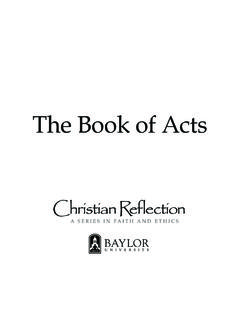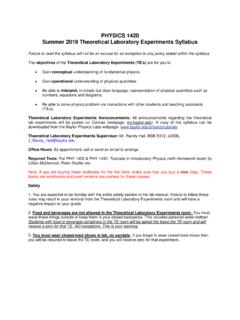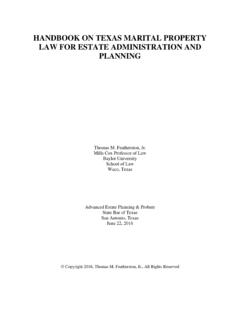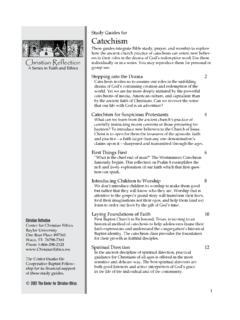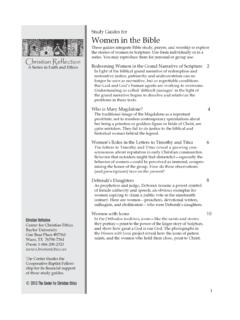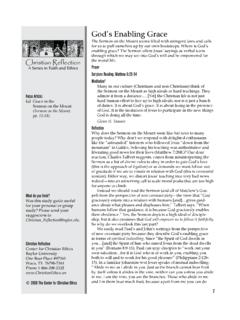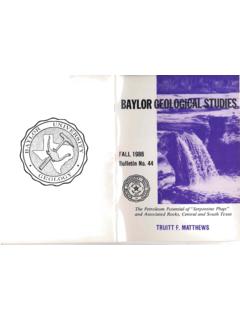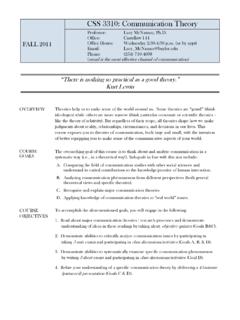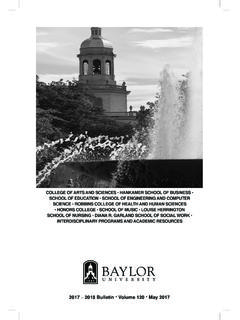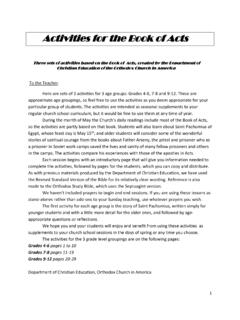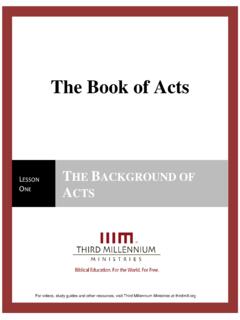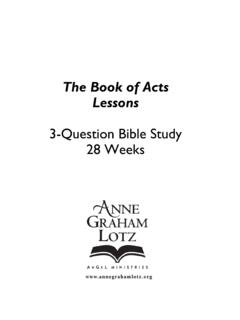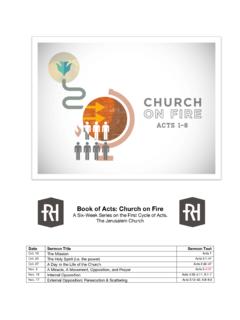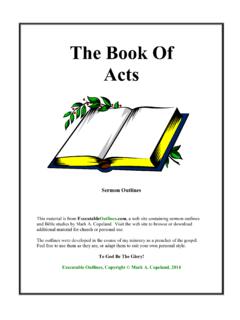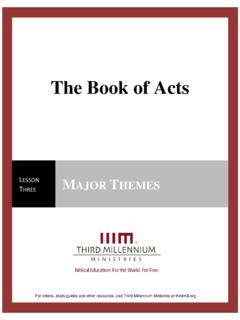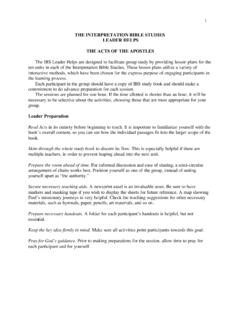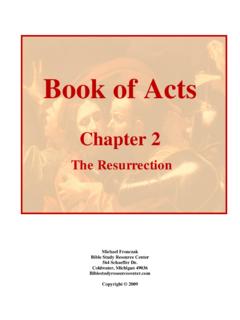Transcription of Book of Acts - baylor.edu
1 1 Christian ReflectionA Series in Faith and EthicsStudy Guides forBook of ActsThese guides integrate Bible study, prayer, and worship to explore the acts of the Apostles as a theological treatsure that can shape our discipleship today. Use them individually or in a series. You may reproduce them for personal or group Spirituality of acts 2 The book of acts is focused on God s mission, as God draws people into his orbit and brings them into his community, and so its spirituality is missional. God takes the initiative using a variety of creative means, and people respond in community to the awesome God who makes himself known in Jesus and by the Spirit. Reading acts as a Sequel to the Fourfold Gospel 4 The book of acts was intended to be a sequel to a plurality of Gospels, which Luke refers to as many. Thus, to read acts for all it s worth, it is necessary to attend to the connections not only with Luke s Gospel, but also with those other narratives that recount the story of Jesus echoed in acts .
2 Paul and the Philosophers 6 Paul s speech to the Areopagus Council is a paradigm for cross-worldview evangelism. He restates the good news in terms that maintain common ground where a similiarity of viewpoints is at hand, but retains the distinctiveness of his message on points that allow for no compromise. Warning to the Wise: Learning from Eutychus s Mistake 8 The downfall of Eutychus is, to modern ears, a strange story. (We are more likely to criticize Paul s long-winded preaching than the youthful listener who dozes off.) But the story offered moral guidance to ancient readers, exhorting them to learn from Eutychus s youthful mistakes and to avoid spiritual laxity at all , Hospitality, and Friendship 10 The story of Paul s sea-voyage to Rome with a violent storm, shipwreck, and adventures on Malta provides not only a glimpse of Paul as one who was open to fresh encounters with all peoples but also, surprisingly, a lasting impression of Gentiles as receptive, friendly, and hospitable.
3 Christian ReflectionInstitute for Faith and LearningBaylor UniversityOne Bear Place #97270 Waco, TX 76798-7270 Phone 2015 Institute for Faith and Learning2 What do you think?Was this study guide useful for your personal or group study? Please send your suggestions to Article: A Spirituality of acts (The book of acts , pp. 11-18)Suggested Articles: Repeition for a Reason (The book of acts , pp. 73-77)Christian ReflectionA Series in Faith and EthicsChristian ReflectionInstitute for Faith and LearningBaylor UniversityOne Bear Place #97270 Waco, TX 76798-7270 Phone 2015 Institute for Faith and LearningA Spirituality of ActsThe book of acts focuses on God s mission, as God draws people into his orbit and brings them into his community, and so its spirituality is missional. God takes the initiative using a variety of creative means, and people respond in community to the awesome God who makes himself known in Jesus and by the you have laid down your life for us, and call us to lay down our lives for one another.
4 Grant us eyes to see the needs of those around us, discipline to restrain our own greed for time or possessions so that we can share with our neighbors, and joy as we serve alongside one another as your Church. Prosper the work of our hands Lord, and let your kingdom come. AmenScripture Reading: acts 1:1-8 ReflectionIn acts , the human encounter with God, which is the heart of what Steve Walton means by spirituality, is turned outward, not inward. We find little description or discussion of believers inner lives, Walton notes. Rather, the accent is on what God is doing: humans are to look for what God is doing and to join in. He traces the contours of spirituality in acts , beginning with the agents and means that God uses to move toward humans. God engages humans directly through the persons of the exalted Jesus and the Holy Spirit. Jesus does not disappear from acts after he ascends to the Father ( acts 1:9-11); rather he reigns at God s right hand and is rightfully called Lord (2:33, 36).
5 Walton notes, He now pours out the Spirit, something that Yahweh, and Yahweh alone, does in previous times. To encounter Jesus is to encounter the God of Israel. Jesus leads the believing community at key moments: he appears to the martyr Stephen in a vision (7:55-58), confronts Saul (9:4-5), guides Ananias to baptize and heal Saul (9:10-16), heals Aeneas (9:34; cf. 3:6, 16; 4:7, 17, 30) and, as disciples call on his name, drives out evil spirits (16:18; cf. comically, 19:11-17).Through the Holy Spirit, God engages humans through visions and dreams ( , acts 7:55; cf. 2:17), direct instruction ( , 8:29, 39; 10:19-20; 11:28), charismatic discernment ( , 6:3, 5), charismatic praise ( , 2:4, 11b), and charismatic preaching and teaching ( , 2:14-36; 4:8-12, 29-31). God guides humans through divine messengers, whom Luke calls angels. Through the word of an angel, God sends Philip to lead the Ethiopian eunuch to faith ( acts 8:26), instructs Cornelius to send for Peter who will lead his household to faith (10:3-6), and assures Paul that he will survive the sea storm in order to bear witness before Caesar (27:23-24).
6 Angels also act in space and time, Walton observes. Peter is freed from prison twice through angelic intervention (5:19; 12:7-11)..to continue his mission work. God employs various means to engage people in the book of acts , but four are striking: visions and dreams, Scripture interpreted in light 3 Christian ReflectionA Series in Faith and EthicsRobert B. Kruschwitz, the author of this study guide, is Senior Scholar in The Institute for Faith and Learning at baylor University. He serves as General Editor of Christian Reflection. 2015 Institute for Faith and Learningof Jesus, the word of the Lord [or God], and the name of Jesus. Though the instances of their use in acts may be dramatic, Walton says each means resonates with Christian experience through the centuries, including today. So, if this is how God engages with humans, how do they respond to the divine initiatives? The human response tends to be: slow and partial.
7 For example, even Philip and Peter must be nudged to approach Gentiles ( acts 8:29, 10:19-20). Other believers must be convinced (11:3-18) and their leaders debate how to proceed (15:1-29). Years later, false rumors of Paul s stance toward Gentiles start the events leading to his imprisonment (21:20-36). Luke s realistic portrayal of the slowness of religious people to no picture of unhindered progress of the gospel from Jerusalem to Rome, but rather believers mixed response to God, warts and all. community-centered. All of the activities of the believers meetings the apostles teaching, fellowship and sharing goods, prayers, and breaking bread are expressed with plural verbs in acts 2:42-47. saturated with prayer usually in community ( acts 1:14 [cf. 1:4-5]; 1:24; 13:2-3), but also in individual piety (10:2, 4; 9:11). in the context of human suffering. Believers do not see persecution as showing that they are getting things wrong, but as a call to seek God s power and boldness, Walton writes.
8 They do not pray for deliverance from persecution, but for God s strength and grace in persecution ( acts 4:29-31). characterized by fear, or awe, whenever believers recognize God s greatness ( acts 2:43; cf. 5:5, 11; 9:31; and 19:17). Walton concludes, acts portrays God Father, Son, and Spirit as actively engaged in the world, seeking humans to join in their mission. God is the initiator and driver of this mission, and its key end for it is through the mission that people encounter God-in-Christ by the Spirit, and are being transformed into the people God calls them to be. Study Questions1. Through what agents does God engage humans in the book of acts ? Does God continue to engage people today through these agents?2. Discuss the four means that God employs to engage humans in acts . How, and to what degree, are each of these evident within your congregation and in your experience?3.
9 Consider the five major features of people s response to God in the book of acts . In your experience, how do these characterize the response of believers today?4. In the three versions of Paul s encounter with Jesus on the Damas-cus road (9:1-9; 22:3-11; 26:4-20), what elements of the spirituality outlined here are prominent?5. How do the three versions of the Damascus road experience differ? Why, according to Timothy Churchill, does Luke draw attention to this event with such repetition?Departing Hymn: As Christ and Church and Congregation 4 What do you think?Was this study guide useful for your personal or group study? Please send your suggestions to ReflectionA Series in Faith and EthicsFocus Article: Reading acts as a Sequel to the Fourfold Gospel (The book of acts , pp. 19-26)Suggested Articles: A Story that Teaches: The Theology of acts (The book of acts , pp.)
10 82-87) Studying The book of acts (The book of acts , pp. 88-93)Christian ReflectionInstitute for Faith and LearningBaylor UniversityOne Bear Place #97270 Waco, TX 76798-7270 Phone 2015 Institute for Faith and LearningReading acts as a Sequel to the Fourfold GospelThe acts of the Apostles was intended to be a sequel to a plurality of Gospels, which Luke refers to as many (Luke 1:1). Thus, to read acts for all it s worth, it is necessary to attend to the connections not only with Luke s Gospel, but also with those other narratives that recount the story of Jesus echoed in Reading: acts 9:36-10:33 ReflectionContemporary scholars often talk about Luke- acts , but curiously in the New Testament canon or order of books, acts is not paired with its companion volume, the Gospel of Luke. Instead, it occupies a unique position as a hinge between the four Gospels and all the other writings.
